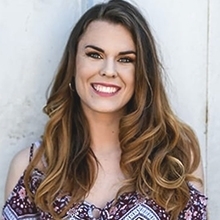Temporomandibular Joint (TMJ) disorder affects five to twelve percent of the general adult population and is twice as common in women. A recent graduate from UC Davis in Integrative Pathobiology and ARCS Scholar Alum Carissa Garrity studied how to regenerate cartilage and TMJ as research for her PhD.
Diagnosed with TMJ as a teenager, Garrity is familiar with the symptoms and treatment associated with the disorder. “Basically, your cartilage disc will dislodge, causing the jaw to lock up,” she explains. The cartilage disc that allows for movement can dislodge and leads to its degradation and eventually arthritis.
Garrity chose UC Davis for their Integrative Pathobiology program because it didn’t require her to go to medical school beforehand, and it led her to find a principal investigator who researched TMJ. They focused on cartilage regeneration with the hopes of helping TMJ patients. She compares cartilage loss to fabric with a loose string you keep pulling. Eventually, the fabric dissipates over time. “Our goal is to try to replace the tissue that’s been lost,” she summarizes.
Garrity shares three ways to regenerate cartilage tissue using one of the following cell sources: the patient’s own cells, a donor, or an animal. She researched where the cells come from and how to regenerate cartilage tissues without the patient’s body rejecting the transplant.
Rejection happens when a specific molecule in a patient’s cells recognizes something foreign; it will reject the implant. Garrity’s research investigated how to get rid of that specific molecule in cells. Through CRISPR, she can isolate and remove that particular segment of the gene, making the cell incapable of being rejected. “The body has no way of detecting if it’s foreign or not, so it accepts it,” Garrity explains. The process is akin to an invisibility cloak for transplants.
This research has significant implications for patients waitlisted for transplants. “Nobody has to wait for years on end to find a match,” Garrity says, “I can give you any piece of tissue that I grow and know for a fact your body isn’t going to reject it.”
Considering that there are over 100,000 patients on the national transplant waiting list and 17 people die each day waiting for an organ transplant, Garrity’s research can quite literally save lives and increase patients’ quality of life in a shorter amount of time. In the context of TMJ, “It doesn’t really fix the main problem at hand, which is either dislocation or inflammation in the joint, but it helps alleviate the pain and the tissue that you need to replace eventually,” explains Garrity.
Garrity is grateful for the ARCS Scholar Award, which funded her tuition in the last quarter of her PhD.
She also appreciates the emphasis ARCS places on continuing education, a value she embodies daily. “I grew up with the notion that the day you stop learning is the day you start dying,” she admits, “You should always try to improve yourself every day in some way.” And with ARCS Foundation’s support, Carissa Garrity did just that.

